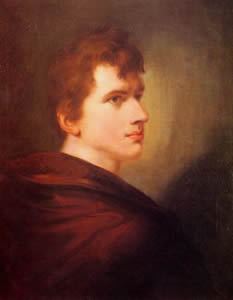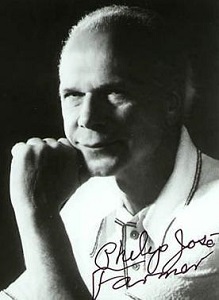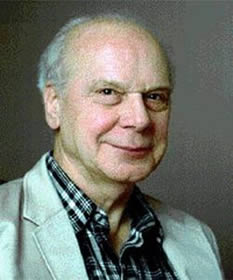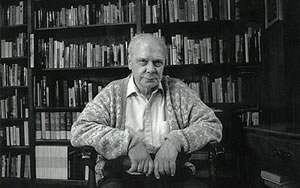De Nederlandse schrijver Menno ter Braak werd geboren op 26 januari 1902 in Eibergen. Zie ook mijn blog van 26 januari 2007 en ook mijn blog van 26 januari 2008 en ook mijn blog van 26 januari 2009.
Uit: Hampton Court
‘Wanneer mijn trein het signaal gepasseerd is, zal de seinwachter het weer op onveilig moeten stellen. Doet hij dat niet, gaat hij bijvoorbeeld eerst een kop koffie drinken of blijft hij mijn trein enige minuten nastaren, dan is de mogelijkheid niet uitgesloten, dat een andere trein – er moeten op dit baanvak immers ontzettend veel treinen lopen – gebruik maakt van het signaal, dat nog op veilig staat. Hij slipt er als het ware tussendoor, en als de baanwachter naar de handle grijpt, is het te laat! Hij heeft het nakijken! Als een razende telefoneert hij naar links en rechts: “De D-trein is mij te gauw af geweest! Alle seinen op onveilig zetten! Het zal nooit weer gebeuren, ik beloof het op mijn erewoord! … Wat, gelooft U mij niet? Neen, waarachtig het is ernst! Ik was precies één seconde te laat, anders … Maar klets toch niet langer, zet alle seinen op onveilig, misschien loopt het dan nog goed af! Vooruit dan toch, verdomme, voor de rechtbank kunnen we verder praten over de schuldvraag! Alles op onveilig!” Dan zetten ze aan alle stations op het traject alles op onveilig. De signalen kijken nu zonder onderscheid op hun neus; het lijkt zo naïef, maar het wil zeggen, dat zelfs een alleenrijdend locomotiefje halt moet houden. Alle machinisten spreken hun verbazing en ergernis uit tegenover hun stokers; zij maken oorverdovend lawaai met hun stoomfluiten, want van die plotselinge vertraging begrijpen zij niets, nu het buiten de drukke vacantiemaanden is. Maar de signaalstaken trekken er zich geen duit van aan; zij blijven bedaard op hun neus kijken. Als het langer duurt, stappen de conducteurs uit de wagons, waarin zij juist zaten te slapen, en na vijf minuten wachten beginnen ook de passagiers lont te ruiken en druk te informeren; omdat niemand hen kan inlichten, lopen er binnen het kwartier overal wilde geruchten, waarover de conducteurs, die ze zelf verspreiden, dan weer hun schouders ophalen: men kan wel zoveel vertellen! Intussen rijdt de doorgeslipte D-trein met een duivelse vaart geleidelijk op mijn trein in. Hij wint iedere minuut misschien wel vijfhonderd meter. Wij bevinden ons op een vogelvrij baanvak, in een volmaakt onwettige race! Trouwens, de enige, die het weet, ben ik! De machinist van mijn trein kijkt voor zich uit en doet zijn plicht, omdat hij voor zich uit kijkt. „

Menno ter Braak (26 januari 1902 – 14 mei 1940)
V.l.n.r. Clara Eggink, A.Roland Holst, J.C.Bloem, Menno ter Braak en E. du Perron, 1939
De Duitse schrijver Achim von Arnim werd geboren in Berlijn op 26 januari 1781. Zie ook mijn blog van 26 januari 2007 en ook mijn blog van 26 januari 2008 en ook mijn blog van 26 januari 2009.
Uit: Des Knaben Wunderhorn
Gastlichkeit des Winters
Mündlich
Der Winter ist ein scharfer Gast,
Das merkt ich an dem Dache;
Mein Lieb gab mir ein Kränzelein
Von Perlen fein,
Das hab ich von ihr tragen
An meinem Bart und Kragen.
Der Sommer ist ein sanfter Gast,
Es tröpfelt von dem Dache;
Mein Lieb gab mir ein Kränzelein
Im Sonnenschein,
Da ist es aufgethauet,
Von Eis war es erbauet.
Ja traue nur dem Schleicher nicht,
Viel lieber scharfe Worte;
Der Sommer giebt wohl Kränzelein
Von Blumen fein,
Zu ihr kann ich nicht gehen,
Vom langen Tag gesehen.
Zu Ostern, als die Fasten aus,
Da längerten die Tage;
Mein Lieb gab mir ein Unterpfand,
Zween Aermlein blank,
Darin sollt ich mich rüsten,
Zu unsres Winters Lüsten.
Was acht ich der Waldvöglein Sang,
Und aller Kläffer Zungen;
Lieg ich in meinen Aermlein blank,
Ich weiß ihr Dank,
Ich kann von ihr dann träumen;
Wie lange wird sie säumen?

Achim von Arnim (26 januari 1781 – 21 januari 1831)
De Amerikaanse schrijver Jonathan Carroll werd geboren op 26 januari 1949 in New York. Hij is vooral bekend om zijn fantastische en surrealistische fictie. In 1980 maakte hij zijn debuut met The Land of Laughs. Andere boeken van zijn hand zijn Voice of our Shadows (1983), Outside the Dog Museum (1991), Kissing the Beehive (1997), The Marriage of Sticks (2000) en The Wooden Sea (2001). Hij heeft ook korte verhalen geschreven, en onder andere de World Fantasy Award en de British Fantasy Award gewonnen. Jonathan Carroll woont in Wenen.
Uit: Sleeping in Flame
„It took me less than half a lifetime to realize that regret is one of the few guaranteed certainties. Sooner or later everything is touched by it, despite our naive and senseless hope that just this time we will be spared its cold hand on our heart.
The day after we met, Maris York told me I had saved her life. We were in a café, and she said this through the folds of a black sweater she was pulling over her head. I was glad she was lost in the middle of that pullover because the statement, although true, made me feel much too brave and adult and embarrassed. I didn’t know what to answer.
“It’s quite true, Walker. The next time I saw him he would have killed me.”
“Maybe he just wanted to go on scaring you.”
“No, he would have tried to kill me.”
The voice carried no emotion. Her big hands lay open and still on the pink and blue marble table. I wondered if the stone was cold under her palms. If I had been really brave I would have covered her hand with mine. I didn’t.
Every once in a while my friend Nicholas Sylvian calls, in a huff, and says he wants us to make another movie together. He’s got some new moneybags lined up to finance one of the many projects we’ve discussed. When that happens, I usually stop what I’m doing and give him my full attention. Life with Nicholas is fun and exciting, and sometimes very peculiar. I think in our past lives we were probably related in some close and aggravating way—revolutionaries who couldn’t agree on tactics, or brothers in love with the same woman. We always fight a lot when we’re together, but that’s only because we love the same things, despite seeing them from different angles.
This time there was a Herr Nashorn in Munich who was very interested in producing Secret Feet, our adaptation of an obscure short story by Henry de Montherlant to which I owned the rights. The scoop was, Herr Nashorn wanted us to fly to Munich that weekend and talk the whole idea over, courtesy of Nashorn Industries.“

Jonathan Carroll (New York, .26 januari 1949)
De Duitse dichter en schrijver Jochen Missfeldt werd geboren op 26 januari 1941 in Satrup. Zie ook mijn blog van 26 januari 2009.
Chronik des heutigen Tages (1978)
Der Tag begann schon warm
zum Draußenfrühstücken stand das Geschirr
auf rotemWachstuch
Weil eins der Kinder sagte
Ich mag keine Milch schlugen wir
beide mit der Faust auf den Tisch
Anschließend versuchten wir ein Gespräch
gläsern war der Himmel Gräser bebten
aber wir stachen böse mit Worten ineinander
Dann nahmen wir sprachlos das Mittagessen ein
zum Sonnenbaden trennten wir uns
die zwei Großen entließen wir ins Schwimmbad
Ich fühlte die Asche vom gestrigen Grill
besah Zeitungen und fasste viele Bücher an
die Sonnenbrille schob ich auf die Stirn
Unsere Jüngste schickte ich
mit einem weißen Taschentuch zu dir
und endlich schrieb ich alles auf.
Jochen Missfeldt (Satrup, 26 januari 1941)
De Nederlandse schrijver Gerrit Jan Zwier werd geboren in Leeuwarden op 26 januari 1947. Zie ook mijn blog van 26 januari 2007 en ook mijn blog van 26 januari 2008 en ook mijn blog van 26 januari 2009.
Uit: Naar Patagonië!
„Ushuaia, een havenstad aan de zuidpunt van Vuurland, ligt aan de voet van besneeuwde bergen waarvan de hellingen met bos bedekt zijn. Hoe hoger je komt, hoe ordelozer de bebouwing en het stratenpatroon. Oorspronkelijk was het een ballingsoord waar de Argentijnse regering haar zware jongens opborg. De gevangenis is nu in een museum veranderd. Aan het eind van de negentiende eeuw heerste er even een goudkoorts rond de stad, die echter weinig mensen rijk heeft gemaakt. De recente groei van de stad houdt vooral verband met de klandizie van cruiseschepen die op weg zijn naar Antarctica. Hoogbejaarde Amerikanen en Europeanen, met de naam van hun schip op de revers van hun rode zeiljas geschreven, zijn vertrouwde verschijningen in het straatbeeld. Avenida San Martin, de lange winkelstraat bij de haven, is een aaneenschakeling van zaken die leren schoenen en laarzen, knuffelpinguïns en souvenirs van roze Patagonische steen verkopen.
Het ‘Museum van het einde van de wereld’ (Museo del Fin del Mundo) is klein maar fascinerend. Hier komt de turbulente historie van deze plek tot leven. Wij kijken naar sepiakleurige foto’s van verdwenen indianenstammen, zoals de Yámana en Alakaloefs. Zij tonen mannen met schaamlappen en driehoekige bontmutsen. Een paar vitrines verder krijgt missionaris Thomas Bridges alle aandacht. Zelfs in de reisgidsen wordt zijn naam genoemd als de auteur van het Yámana-Engelse woordenboek, dat ruim dertigduizend woorden – niet alfabetisch gerangschikt – bevat.
Eeuwenlang flakkerden de vuurtjes van deze zeenomaden langs de kusten van Vuurland, een woest en bergachtig gebied. Ook in hun beste jaren zullen er nooit meer dan een paar duizend indianen zijn geweest. Schaaldieren, zeehonden en vogels stonden geregeld op hun menu. Ze smeerden hun lichaam in met dikke lagen zeehondenvet om zich tegen de kou te beschermen. ‘s Nachts overvielen ze de broedkolonies van pinguïns en knuppelden de vogels dood.“

Gerrit Jan Zwier (Leeuwarden, 26 januari 1947)
De Surinaamse dichter Bhai (eig.James Ramlall) werd geboren op 26 januari 1935 in het toenmalige district Suriname. Zie ook mijn blog van 26 januari 2007 en ook mijn blog van 26 januari 2008 en ook mijn blog van 26 januari 2009.
kaun jâne
(wie weet)
Misschien ben ik een zucht,
stil in een mens;
een zaad, verborgen in een vrucht,
een beeld in marmer,
vuur in steen,
kracht in hout,
zanger in een kind,
dichter in een mens…
Misschien.
avara hun
(ik ben een zwerver)
Is dit geluk:
een onderkomen,
een woonvertrek,
een vrouw,
die lacht en zorgt,
een bed,
waarop men ’s avonds weent?
Mij geen geluk:
ik ben een zwerver,
met vreemde krachten,
onzichtb’re machten
om mij heen.
Bhai (District Suriname, 26 januari 1935)
De Amerikaanse schrijver Philip José Farmer werd geboren in North Terre Haute (Indiana) op 26 januari 1918. Met zijn eerste sciencefictionverhaal, dat in 1952 gepubliceerd werd, maakte hij direct een grote indruk bij de lezers en vooral ook bij zijn collega SF-schrijvers. Dat verhaal, The Lovers, bezorgde hem een jaar later een Hugo Award. In de vele jaren daarna schreef Farmer nog eens ruim honderd korte verhalen en ruim zeventig romans. De bekendste hiervan zijn ongetwijfeld de Riverworld-boeken, beginnend met To Your Scattered Bodies Go uit 1972. Andere bekende werken zijn de zes romans in de World of Tiers series, de driedelige Dayworld serie en ook de roman Venus on the Half-Shell (1975), zogenaamd geschreven door Kilgore Trout, een fictief persoon uit de romans van Kurt Vonnegut. Met zijn The other log of Phileas Fogg (1973) schreef Farmer tevens een herwerking van Jules Vernes Reis rond de wereld in tachtig dagen. Philip José Farmer overleed begin 2009 op 91-jarige leeftijd.
Uit: To Your Scattered Bodies Go
„His wife had held him in her arms as if she could keep death away from him.
He had cried out, “My God, I am a dead man!”
The door to the room had opened, and he had seen a giant, black, one-humped camel outside and had heard the tinkle of the bells on its harness as the hot desert wind touched them. Then a huge black face topped by a great black turban had appeared in the doorway. The black eunuch had come in through the door, moving like a cloud, with a gigantic scimitar in his hand. Death, the Destroyer of Delights and the Sunderer of Society, had arrived at last.
Blackness. Nothingness. He did not even know that his heart had given out forever. Nothingness.
Then his eyes opened. His heart was beating strongly. He was strong, very strong! All the pain of the gout in his feet, the agony in his liver, the torture in his heart, all were gone.
It was so quiet he could hear the blood moving in his head. He was alone in a world of soundlessness.
A bright light of equal intensity was everywhere. He could see, yet he did not understand what he was seeing. What were these things above, beside, below him? Where was he?
He tried to sit up and felt, numbly, a panic. There was nothing to sit up upon because he was hanging in nothingness. The attempt sent him forward and over, very slowly, as if he were in a bath of thin treacle. A foot from his fingertips was a rod of bright red metal. The rod came from above, from infinity, and went on down to infinity. He tried to grasp it because it was the nearest solid object, but something invisible was resisting him. It was as if lines of some force were pushing against him, repelling him.“
Philip José Farmer (26 januari 1918 – 25 februari 2009)
Zie voor nog meer schrijvers van de 26e januari ook mijn vorige blog van vandaag.











